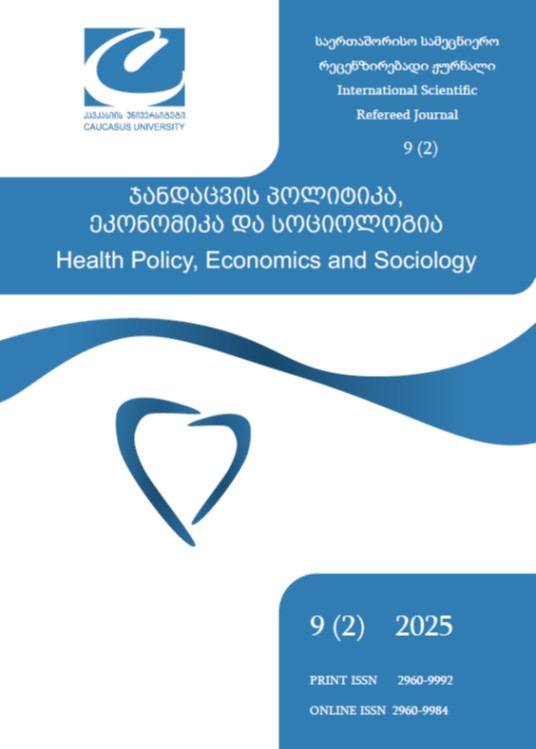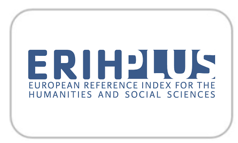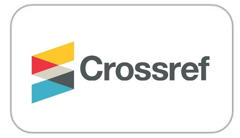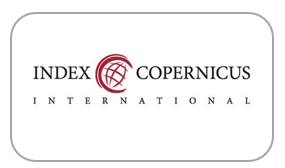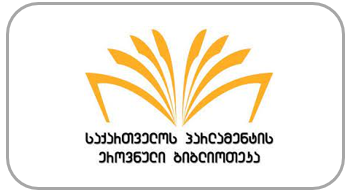The Crisis of Trust in the Digital Age: Potential and Limitations of Civic Engagement in Georgia
DOI:
https://doi.org/10.52340/healthecosoc.2025.09.02.10Keywords:
democratization, disinformation, political trust, civic engagement, digital democracyAbstract
Introduction: This article examines the complex impact of digital technologies on civic engagement and political trust in contemporary Georgia. The central issue emerges from the paradox of digital democracy: although online activism and digital participation have become increasingly prevalent, levels of institutional trust remain persistently low. This paradox is shaped by the legacy of the Soviet past, the dynamics of a politicized media environment, the proliferation of disinformation, and the dominance of aggressive rhetoric—all of which reinforce civic nihilism and deepen political apathy. Methodology: The study employs a triangulated research design that integrates quantitative and qualitative approaches. It draws on a retrospective documentary review (covering studies conducted between 2010 and 2024), analysis of quantitative data (CRRC, NDI), six qualitative interviews with civil society and media experts, and a content analysis of social media platforms. The chronological focus is the post-2020 period, characterized by the intensification of digital politics. Results: The findings demonstrate that while digital technologies substantially enhance civic self-expression and public awareness, this activity does not translate into sustainable or structurally embedded engagement. The spread of disinformation, the fragmentation of the information environment, and the prevalence of polarized rhetoric significantly constrain public discourse and erode political trust. Despite the growing scope of the digital sphere, institutional trust remains low, perpetuating political passivity. Conclusion: The study highlights that technological advancement, by itself, does not ensure the consolidation of democracy. Digital activism becomes fragile when disconnected from institutional trust, situating digital democracy in Georgia within a field of profound contradiction. Strengthening civic participation requires not only expanding technological access but also improving media literacy, institutional transparency, and accountability. Addressing this paradox calls for interdisciplinary and innovative research approaches.
References
CRRC საქართველო. (2022). მოსახლეობის პოლიტიკური განწყობები და ციფრული ჩართულობის კვლევები საქართველოში.
CRRC საქართველო. CRRC საქართველო. (2023). მოსახლეობის პოლიტიკური განწყობები და ციფრული ჩართულობის კვლევები საქართველოში. CRRC საქართველო.
CTC – ტრენინგისა და კონსულტაციის ცენტრი. (2022). ციფრული ტრანსფორმაცია და სამოქალაქო ჩართულობა საქართველოში. CTC.
Georgia’s Civic Education Association. (2022). ციფრული სამოქალაქო ინიციატივები საქართველოში.
ISFED – თავისუფალი და სამართლიანი არჩევნებისთვის საერთაშორისო საზოგადოება. (2022). სოციალური მედიის მონიტორინგის ანგარიში 2020 წლის საპარლამენტო არჩევნების პერიოდში. ISFED.
NDI – ეროვნული დემოკრატიული ინსტიტუტი. (2020–2023). საქართველოს მოსახლეობის განწყობების კვლევა. NDI.
NDI – ეროვნული დემოკრატიული ინსტიტუტი. (2023). საქართველოს მოსახლეობის განწყობების კვლევა. NDI.
National Statistics Office of Georgia. (2022). ინფორმაციულ-საკომუნიკაციო ტექნოლოგიების გამოყენება საქართველოში. საქართველოს სტატისტიკის ეროვნული სამსახური.
Social Justice Center. (2022). დემოკრატიული მონაწილეობა და პოლიტიკური ნდობა საქართველოში. Social Justice Center.
Transparency International Georgia. (2023). ანგარიში დეზინფორმაციისა და მედია-გარემოს შესახებ.
თბილისის პოლიტიკის კვლევის ცენტრი. (2024). პოლიტიკური პარტიების ციფრული კომუნიკაციის ანალიზი.
Allcott, H., & Gentzkow, M. (2017). Social media and fake news in the 2016 election. Journal of Economic Perspectives, 31(2), 211–236. https://doi.org/10.1257/jep.31.2.211
Bawden, D., & Robinson, L. (2009). The dark side of information: Overload, anxiety and other paradoxes and pathologies. Journal of Information Science, 35(2), 180–191. https://doi.org/10.1177/0165551508095781
Benkler, Y., Faris, R., & Roberts, H. (2018). Network propaganda: Manipulation, disinformation, and radicalization in American politics. Oxford University Press. Bennett, W. L., & Segerberg, A. (2012). The logic of connective action: Digital media and the personalization of contentious politics. Journal of Communication, 62(5), 739–768. https://doi.org/10.1111/j.1460-2466.2012.01631.x
Castells, M. (2011). The rise of the network society (2nd ed.). Wiley-Blackwell.
Coleman, S., & Blumler, J. G. (2019). The internet and democratic citizenship: Theory, practice and policy. Cambridge University Press.
Creswell, J. W., & Plano Clark, V. L. (2011). Designing and conducting mixed methods research (2nd ed.). SAGE Publications.
Dahl, R. A. (1989). Democracy and its critics. Yale University Press.
Dalberg, T. (2015). The global impact of digital democracy. Dalberg.
Diamond, L., & Plattner, M. F. (Eds.). (2016). Democracy in decline? Johns Hopkins University Press. Freedom House. (2022). Freedom on the net 2022. https://freedomhouse.org [უკანასკნელი გადამოწმება: 05.08.2025].
Freedom House. (2023). Freedom on the net 2023. https://freedomhouse.org [უკანასკნელი გადამოწმება: 05.08.2025].
Freedom House. (2023). Nations in transit 2023: Georgia country report. https://freedomhouse.org [უკანასკნელი გადამოწმება: 05.08.2025].
Jenkins, H., Ford, S., & Green, J. (2016). Spreadable media: Creating value and meaning in a networked culture. New York University Press.
Levi, M., & Stoker, L. (2000). Political trust and trustworthiness. Annual Review of Political Science, 3, 475–507. https://doi.org/10.1146/annurev.polisci.3.1.475
Loader, B. D., & Mercea, D. (Eds.). (2011). Social media and democracy: Innovations in participatory politics. Routledge.
McQuail, D. (2010). McQuail’s mass communication theory (6th ed.). SAGE Publications.
Mitchell, A., Jurkowitz, M., Oliphant, J. B., & Shearer, E. (2020). Americans who mainly get their news on social media are less engaged, less knowledgeable. Pew Research Center. https://www.pewresearch.org [უკანასკნელი გადამოწმება: 05.08.2025].
Morozov, E. (2011). The net delusion: The dark side of internet freedom. PublicAffairs. Morozov, E. (2013). To save everything, click here: The folly of technological solutionism. PublicAffairs.
Napoli, P. M. (2019). Social media and the public interest: Media regulation in the disinformation age. Columbia University Press. Newton, K. (2001). Trust, social capital, civil society, and democracy. International Political Science Review, 22(2), 201–214. https://doi.org/10.1177/0192512101222004
Norris, P. (2011). Democratic deficit: Critical citizens revisited. Cambridge University Press. Pew Research Center. (2022). Social media and politics: A global perspective. https://www.pewresearch.org [უკანასკნელი გადამოწმება: 03.06.2025].
Sunstein, C. R. (2018). #Republic: Divided democracy in the age of social media. Princeton University Press.
Tufekci, Z. (2017). Twitter and tear gas: The power and fragility of networked protest. Yale University Press.
Vaccari, C., & Chadwick, A. (2020). The challenge of online political misinformation in established democracies. The International Journal of Press/Politics, 25(3), 517–538. https://doi.org/10.1177/1940161219900126
Wardle, C., & Derakhshan, H. (2017). Information disorder: Toward an interdisciplinary framework for research and policymaking. Council of Europe. https://rm.coe.int/information-disorder-report/1680764666 [უკანასკნელი გადამოწმება: 05.07.2025].
Zuboff, S. (2019). The age of surveillance capitalism: The fight for a human future at the new frontier of power. PublicAffairs.
